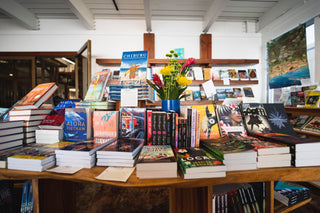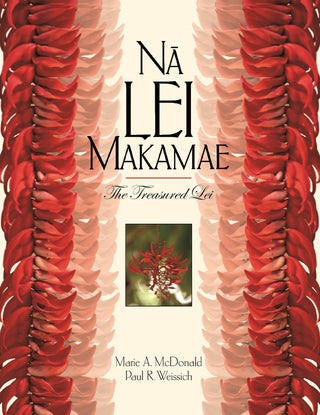Authors: Marie A. McDonald & Paul R. Weissich | Hardcover
Lei are the very expression of traditional Hawaiian culture and were once an essential part of community and family life. Following in the footsteps of Samuel Kamakau, Abraham Fornander, and others, the authors have collected here a wealth of written and oral information to reveal the significance of making and wearing lei and their role in Hawaiian ritual and dance.
This volume covers eighty-five flowers and plants (and another dozen color variations) used in traditional lei construction. They are arranged according to their Hawaiian names and accompanied by botanical information and descriptions gleaned from legends and chants that illustrate the cultural uses and special meanings of lei prior to Western contact. Many are introduced by poems written especially for this work by master kumu hula, linguist, and ethnologist Pualani Kanakaole Kanahele.
The authors present the lei art form in not only words, but also pictures. Lavish color photographs by Jean Coté showcase each plant and lei (shown by itself or worn), as well as places throughout the Islands associated with specific flowers and plants. An appendix includes a complete list of lei plants, basic instructions for their propagation, and other sources for material.
Authors: Marie A. McDonald & Paul R. Weissich | Hardcover
Lei are the very expression of traditional Hawaiian culture and were once an essential part of community and family life. Following in the footsteps of Samuel Kamakau, Abraham Fornander, and others, the authors have collected here a wealth of written and oral information to reveal the significance of making and wearing lei and their role in Hawaiian ritual and dance.
This volume covers eighty-five flowers and plants (and another dozen color variations) used in traditional lei construction. They are arranged according to their Hawaiian names and accompanied by botanical information and descriptions gleaned from legends and chants that illustrate the cultural uses and special meanings of lei prior to Western contact. Many are introduced by poems written especially for this work by master kumu hula, linguist, and ethnologist Pualani Kanakaole Kanahele.
The authors present the lei art form in not only words, but also pictures. Lavish color photographs by Jean Coté showcase each plant and lei (shown by itself or worn), as well as places throughout the Islands associated with specific flowers and plants. An appendix includes a complete list of lei plants, basic instructions for their propagation, and other sources for material.
Questions?



